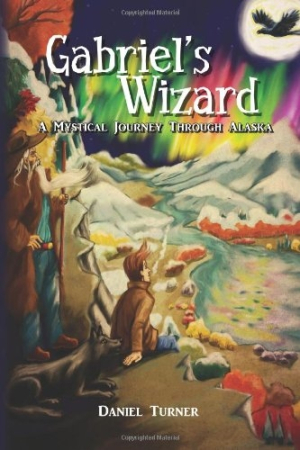Gabriel's Wizard
A Mystical Journey through Alaska
Gabriel is an adventurer. When two of his friends decide to leave school and go seek their fortunes in Alaska, there is no way he is going to stay behind. The three friends make plans that get them only part of the way to Anchorage, and they end up hiking over a mountain in order to make it to their destination.
One beautiful night after making camp, Gabriel decides to go for a walk into the wilderness. He stumbles upon a campfire and meets Schoen, whom he believes to be a mountain man. The two start talking and end up spending the entire night engaged in what Gabriel refers to as “campfire philosophy and mountaintop metaphysics.” As Schoen shares his beliefs about the meaning of life, Gabriel becomes convinced that Schoen is a wizard—a magic man of great power. The lessons Gabriel learns that night will stay with him for the rest of his life.
Though Gabriel’s Wizard is presented as a work of fiction, it reads more like an autobiography. In fact, a note at the end indicates that much of what author Daniel Turner writes here is based on his life. The book contains very little plot. The first four chapters cover Gabriel’s journey north and are presented as though he is sharing a memory—there is no dialogue and the reader sees only the limited perspective of the main character. The rest of the story consists of a discussion between Gabriel and Schoen.
The significance of Turner’s book is not the story itself but rather the wisdom the author has gained through a life of adventure. In the dialogue between Gabriel and Schoen, Turner shares his personal philosophy on the meaning of life and the order of the universe. His writing style is fluid and eloquent. Though not all readers, particularly those that adhere to a specific religious dogma, will agree with everything Turner has to say, there really is a great deal of profound wisdom here.
Turner is able to condense incredibly complex metaphysical concepts into understandable statements. For example, he writes, “Just like the snowflake, everyone is unique. So when we ask the question, what is the meaning of life?, we should expect that the answer will be unique to each individual. Is there a grand, universal meaning to life, or should we start on a more personal scale? What is the meaning of my life? Now you’re dealing with something you can wrap your mind around.”
Gabriel’s Wizard is appropriate for both young-adult and adult readers who are interested in metaphysics and philosophy. Any reader who opens this book with an open mind and an open heart will find something meaningful to take away.
Reviewed by
Catherine Thureson
Disclosure: This article is not an endorsement, but a review. The publisher of this book provided free copies of the book and paid a small fee to have their book reviewed by a professional reviewer. Foreword Reviews and Clarion Reviews make no guarantee that the publisher will receive a positive review. Foreword Magazine, Inc. is disclosing this in accordance with the Federal Trade Commission’s 16 CFR, Part 255.

